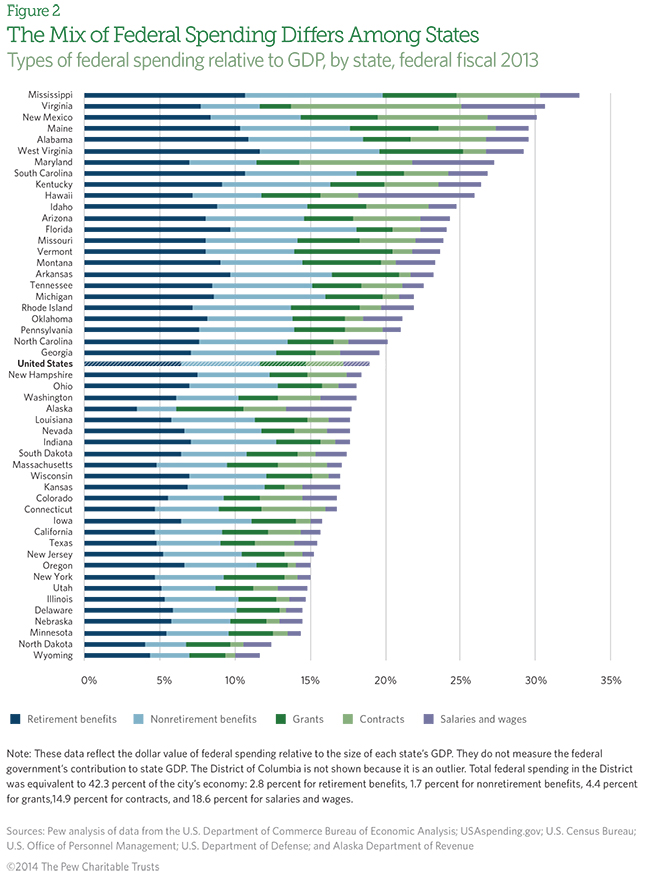Connecting state and local government leaders
California may bring in the most federal dollars, but Mississippi and Virginia get a bigger proportion of the pie depending how you slice it.
It’s no surprise that as the nation’s most populous state, California takes in the most federal dollars. But a new survey from the Pew Charitable Trusts' Fiscal Federalism Initiative reveals that states like Mississippi and Virginia eclipse the Golden State when it comes to per capita and gross domestic product dollars extracted from U.S. taxpayers.
In fiscal year 2013, the federal government spent $16,710 per person in the commonwealth of Virginia, more than any other state. In a close second place was neighboring Maryland ($15,684). Topping them both is the District of Columbia, with a massive $73,920 per person average. For context, the national average is $9,961.
Still, even those inflated numbers make sense in context. Pew organized its methodology into five categories:
- Retirement benefits
- Assistance benefits such as Medicare, student loans and food stamps
- Grants
- Military and medical contracts
- Wages paid to federal employees
Being so close to the heart of the federal government naturally puts Virginia and Maryland at the top of these specific categories, particularly when calculating the wages of federal employees and government contracts.
Outside of the National Capital Region, the most interesting example in the Pew study might be Mississippi, which led the nation last year in federal spending as part of the state’s gross domestic product.
People may not be shouting, "we're number one!" from rooftops in Mississippi today, but when it comes to bringing home federal dollars, nobody does it like the Hospitality State.
Mississippi is a very conservative state with two Republican U.S. Senators and three of its four U.S. House members hailing from the GOP, the political party that’s railed against big government for years. Yet according to the Pew data, federal spending in Mississippi accounted for 32.9 percent of the state’s total economic activity in 2013.

For context, compare that to Wyoming, the state receiving the smallest amount of federal spending. Government dollars accounted for just 11.6 percent of the Equality State’s economic activity during the same period.
However, the Pew study notes that this percentage does not actually measure how much the federal spending directly contributes to each state’s economic activity. Pew also notes that the report does not factor in how much each state invests of its own tax dollars on various programs. Nonetheless, there’s no denying that Mississippi is particularly adept at acquiring a broad range of federal government contracts and benefits.
Federal spending is a real issue in Mississippi but not in the way some might think. Most prominently, Republican Sen. Thad Cochran, a member of the powerful Appropriations Committee, has long been known for his commitment to bringing home government dollars and even explicitly used his penchant for government gifting to help turn around his flailing re-election campaign this past summer after trailing the fiscally conservative state Sen. Chris McDaniel in the state’s GOP primary race.
Despite the influx of federal dollars, Mississippi still consistently ranks at or near the bottom in several poverty metrics of U.S. states, including the annual Kids Count Data Book on child welfare.
With California, Mississippi and Virginia leading their respecting federal spending categories, which states were at the other end of the spectrum taking in the fewest government dollars?
Along with having the lowest percentage of federal spending as part of its GDP, Wyoming also took in the least federal spending overall, at just over $5 billion ($5.177 billion). Needless to say, states with the smallest populations also took in the least total amount of federal money, including North Dakota ($6.8 billion), Vermont ($6.9 billion), South Dakota ($8 billion) and Delaware ($9 billion).
Holding true to its conservative reputation, Utah is the least federally dependent state per capita, receiving an average of $7,108 per person. Minnesota ($8,174), Illinois ($8,188), Nevada ($8,308) and Wisconsin ($8,312) round out the bottom five, respectively.
After Wyoming, states taking in the fewest federal dollars in proportion to their GDP are North Dakota, Minnesota, Nebraska and Delaware.
According the survey, more than two-thirds of the federal funds were spent on retirement benefits and assistance payments alone.
The data also backs up some beliefs that federal spending has been increasing in recent years, with a 26 percent rise government spending over the last decade. Adjusted for inflation, the uptick went from $2.5 trillion to $3.1 trillion.
Perhaps not surprisingly, non-retirement benefits grew the most over the past decade (62 percent). Meanwhile, federal grants for research and other projects grew at a rate of just 6 percent.
However, Pew notes that both figures are largely misleading, noting: “Federal stimulus aid to states resulted in a temporary spike in grants and nonretirement benefit payments during and immediately after the Great Recession; that aid has been almost entirely phased out.”
Along with Mississippi, several other states exceeded the national average in federal dollars received in the 2013 fiscal year. Virginia finished a close second, followed by New Mexico, Maine and Alabama.
Contrary to assumptions about liberal and federal political positions, the states at the top and bottom showcase a diverse mix across the political spectrum. Which, if nothing else, just goes to show that members of Congress can rise above partisanship, at least when it comes to bringing home the bacon for their constituents.



